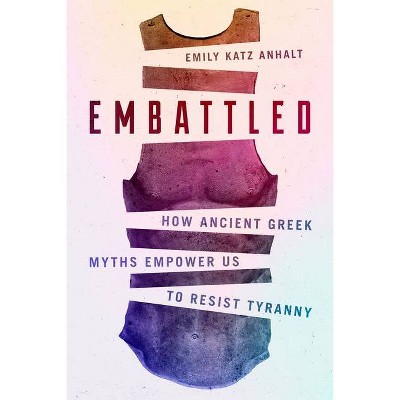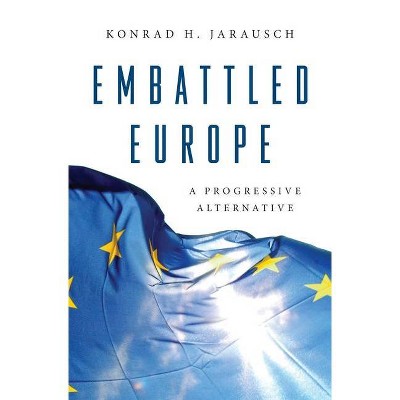Embattled - by Emily Katz Anhalt (Hardcover)

Similar Products
Products of same category from the store
AllProduct info
<p/><br></br><p><b> About the Book </b></p></br></br>"An incisive exploration of the way Greek myths empower us to defeat tyranny. As tyrannical passions increasingly plague twenty-first-century politics, tales told in ancient Greek epics and tragedies provide a vital antidote. Democracy as a concept did not exist until the Greeks coined the term and tried the experiment, but the idea can be traced to stories that the ancient Greeks told and retold. From the eighth through the fifth centuries BCE, Homeric epics and Athenian tragedies exposed the tyrannical potential of not only individuals but groups large and small. These stories identified abuses of power as self-defeating and initiated a movement away from despotism and toward broader forms of political participation. Following her highly praised book "Enraged," the classicist Emily Katz Anhalt retells tales from key ancient Greek texts and then goes on to interpret the important message they hold for us today. As she reveals, Homer's "Iliad" and "Odyssey," Aeschylus's "Oresteia," and Sophocles's "Antigone" encourage us - as they encouraged the ancient Greeks - to take responsibility for our own choices and their consequences. These stories emphasize the responsibilities that come with power (any power, whether derived from birth, wealth, personal talents, or numerical advantage), reminding us that the powerful and the powerless alike have obligations to each other. They assist us in restraining destructive passions and balancing tribal allegiances with civic responsibilities. And they empower us to resist the tyrannical impulses of others and in ourselves. In an era of political polarization, "Embattled" demonstrates that if we seek to eradicate tyranny in all its toxic forms, ancient Greek epics and tragedies can point the way"--<p/><br></br><p><b> Book Synopsis </b></p></br></br><p><b>An incisive exploration of the way Greek myths empower us to defeat tyranny.</b></p> <p>As tyrannical passions increasingly plague twenty-first-century politics, tales told in ancient Greek epics and tragedies provide a vital antidote. Democracy as a concept did not exist until the Greeks coined the term and tried the experiment, but the idea can be traced to stories that the ancient Greeks told and retold. From the eighth through the fifth centuries BCE, Homeric epics and Athenian tragedies exposed the tyrannical potential of individuals and groups large and small. These stories identified abuses of power as self-defeating. They initiated and fostered a movement away from despotism and toward broader forms of political participation.</p> <p>Following her highly praised book <i>Enraged: Why Violent Times Need Ancient Greek Myths</i>, the classicist Emily Katz Anhalt retells tales from key ancient Greek texts and proceeds to interpret the important message they hold for us today. As she reveals, Homer's <i>Iliad</i> and <i>Odyssey</i>, Aeschylus's <i>Oresteia</i>, and Sophocles's <i>Antigone</i> encourage us-as they encouraged the ancient Greeks-to take responsibility for our own choices and their consequences. These stories emphasize the responsibilities that come with power (any power, whether derived from birth, wealth, personal talents, or numerical advantage), reminding us that the powerful and the powerless alike have obligations to each other. They assist us in restraining destructive passions and balancing tribal allegiances with civic responsibilities. They empower us to resist the tyrannical impulses not only of others but also in ourselves. </p> <p>In an era of political polarization, <i>Embattled</i> demonstrates that if we seek to eradicate tyranny in all its toxic forms, ancient Greek epics and tragedies can point the way.</p><p/><br></br><p><b> Review Quotes </b></p></br></br><br>A thought-provoking exploration of how the ancient Greeks developed forms of storytelling to interrogate what it means to be a leader and how despotic leaders tend to abuse their power. The ancient myths at the center of this book speak to the present moment with uncanny prescience, as if written for our time as both a warning and an opportunity to rehearse the moral choices that we and our leaders must make each day.--Bryan Doerries "author of <i>The Theater of War: What Ancient Greek Tragedies Can Teach Us Today</i>"<br><br>Anhalt encourages readers to look with fresh eyes at how easily power can be abused and how to fight back against despotic rule. Her engaging retellings of stories from ancient Greek epic and tragedy show just how relevant these texts are in the political climate of the twenty-first century. --Donna Zuckerberg, author of <i>Not All Dead White Men: Classics and Misogyny in the Digital Age</i><br><br>The Greeks endured violence and demagoguery but also created antidotes, from the <i>Odyssey</i>'s depiction of survival skills like rational deliberation, to the deep probes of politics by Aeschylus and Sophocles. Emily Katz Anhalt brilliantly articulates what this hard-won ancient wisdom offers those battling anti-democratic forces today.--Richard Martin "author of <i>Myths of the Ancient Greeks</i>"<br><p/><br></br><p><b> About the Author </b></p></br></br><b>Emily Katz Anhalt</b> is Professor of Classics at Sarah Lawrence College. Her most recent book is <i>Enraged: Why Violent Times Need Ancient Greek Myths</i>, which was selected as one of the <i>Times Literary Supplement</i>'s Best Books of 2017.
Price History
Cheapest price in the interval: 23.99 on October 27, 2021
Most expensive price in the interval: 23.99 on December 20, 2021
Price Archive shows prices from various stores, lets you see history and find the cheapest. There is no actual sale on the website. For all support, inquiry and suggestion messagescommunication@pricearchive.us




















